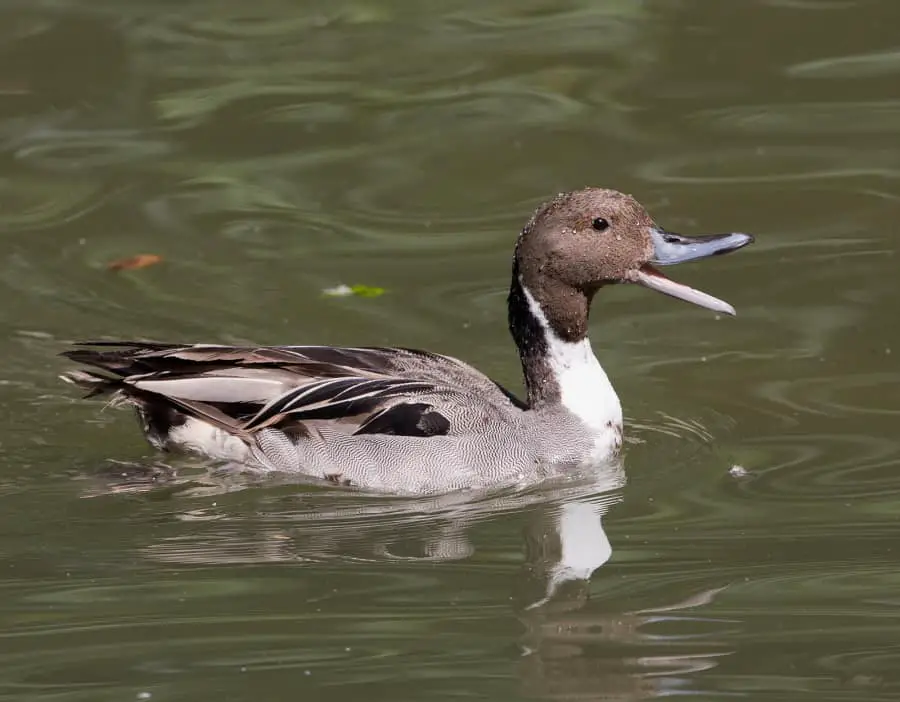
We have all heard the sweet sound of a duck call from a nearby pond or puddle. Ducks are extremely vocal creatures. Sometimes it can seem as if they are having a constant, non-stop conversation. From hisses to chatters, your ducks can say it all. The trick is understanding what they are communicating.
Why do ducks get noisy? Ducks communicate just as any other animal does. Their forms of communication consist of whistles, barks, and even purrs. Each sound has a specific meaning and intention that is meant to either protect them from predators, call their young, show their affection, or even scold another duck.
Whether you have only one duck, or you have a flock of them, you probably already know just how loud they can be. Maybe you have even noticed that some are much louder than others, and some you rarely ever hear at all. Little ducklings understandably have a very soft quack because they haven’t had much time to exercise their vocals. But males, even as adults, have softer and raspier quacks that are sometimes hard to hear over the females.
Why Ducks Get Noisy
The first thing you should know is that female ducks have a tendency to be chattier than males. They are known to blabber constantly and seemingly without end. Whereas males are heard less frequently, so much so that their quack sounds raspy with non-use.
When ducks reach adulthood, they tend to quiet down for the most part. Their vocalizations are toned down and you will only hear them get loud when they need immediate attention. They can still make other noises that are quieter such as their sighs, peeps, and purrs. These noises are usually associated with nuzzling and loving interactions from the ducks.
Ducks grow extremely fast. Within two weeks, your ducklings will be more than double the size and eating just as much. Around this time, they look more like they’re in an awkward pre-teen stage and they can become super loud. Ducks tend to always want to be heard when they are young. Much like our human kids of today. They act surprisingly similar and can be just as noisy.
Other Considerations
You can also hear noises that aren’t vocal, such as the splashing of the water that they clean their face in or the thumps or their wings as they move and in some cases take flight. These are nowhere near as loud as hoots and barks that are warning of danger.
Sometimes, you might hear your ducks talking to each other from across the yard, and sometimes that can be a bit noisy. But it’s also usually in the middle of the day, and it’s entertaining to watch.
In some cases, it depends on the breed of duck you have. For example, the Call ducks are considered the loudest breed of duck, hence the name. So, if you’re worried about your ducks being overly noisy, these are probably the breed you will want to steer clear of. You don’t have to worry too much about Bantam ducks. These are garden ducks that make very little vocalization.
Generally, ducks are noisiest during the daytime when they are most active. Of course, there are special circumstances, such as a mother duck laying an egg or a predator getting into their duck house. But the neighbors shouldn’t be too bothered by the chitter-chatter of your ducks when they too are up and about. Around this time, most people are more tolerant of noisy animals. And when night falls, these little cuties go to sleep just like everyone else.
Why Are My Ducks So Loud?
When ducks are loud, it’s generally because they are trying to gain your attention or the attention of the other ducks. Whether this is because they feel they are in danger and need your protection or they just want a little extra love at that moment, they always have a reason for their sounds. With these two examples, there will be clear indicators in the level of sound they make and the actions they take, whether or not their noise is cause for concern.
As I mentioned previously, ducks hoot and bark to attract attention to a potential threat, but they also chatter and honk when they are feeling talkative or want to get a clear message across. You will also hear sounds of hissing, grunts, and coos that you may be surprised to hear coming from a duck. You wouldn’t think a bird could hiss, but if they want nothing to do with you at that moment or they are afraid of you, you bet you’ll be hearing a hiss come from one of them.
All of their noises are meant to communicate something to either you or their fellow ducks. Sometimes it is simply idle chit chat to the female duck next to them, but it is their way of socializing and communicating their needs. They might need more food because they’re hungry, or more importantly, water to get their food down. Oftentimes, they need water to clean out their eyes and nostrils to prevent infection.
Why Ducks Quack So Much
No matter what the case, ducks are using their vocals to communicate an immediate need. If it gets too loud, it’s probably really important and they need you at that moment. They don’t have the luxury of forming words and simply speaking their needs out loud. Instead, they rely on their noisy sounds and you to figure out what those noisy sounds mean.
Sometimes you might even see a female duck quack at her ducklings to communicate a direction or to even reprimand one of them. Females are more often than not, quacking about something. They quack when they’re alone or when they’re with other ducks, and they quack when they lay eggs and when they are afraid. They are very loud compared to male ducks.
What to Do About a Noisy Duck
When considering the noise ducks make, remember that drakes make very little noise. Not only that but some breeds of duck, male or female, make almost no noise unless they are frightened. For example, Muscovy ducks make little to no sound, so you wouldn’t have to worry about any excessive quacking disturbing your neighbors.
If you listen closely and regularly to your ducks’ noisy tendencies, you might find that you’ll actually start to pick up on what they are trying to communicate. Because each noise is meant for a particular meaning, you may start to see a pattern in activities in relation to their noises.
Here’s What You Need to Do
Your best bet is to listen to what they have to say. If you are worried about disturbing your neighbors, maybe look into a quieter breed of duck. But otherwise, try to deduce what your duck is trying to tell you or your other ducks. Normally, noisy and loud sounds are cause for alarm. You would want to see what was causing such a ruckus in this case, just in case one of your ducks is in trouble with a predator or another duck, or if they are hurt.
The most important thing about this is that their noises shouldn’t be a reason to relocate them. All animals have some form of communication, some may just be louder than others. And the best way to deal with loud noises from a duck is to see what all the noise is about. If you keep them fed and provide a constant source of water then they should be content for the most part.
Easy Fixes
In some cases, the weather might be too hot or too cold for them and they are trying to get your attention to turn on their heat lamp or refill their pool with cold water. It might even be something as small as them being bored and missing you. As long as they are happy, healthy, and well taken care of, you shouldn’t have to worry too much about noise. And if there is a lot of noise, it’s usually for something that’s easy to fix.
Also, a helpful tip for appeasing any disgruntled neighbors is to give them some of the eggs you collect from your ducks. If you don’t plan on hatching them and having babies, and your neighbors constantly complain about the noise levels of your ducks, you could give them a small bribe of fresh eggs that the ducks they hate so much just laid. After that, they won’t want to complain about the noise. They’ll be more concerned about the eggs.
The Main Point
The main point is that raising ducks can be noisy and it might get you into a little bit of trouble with the neighbors. But the reward of companionship you receive in return is well worth it and can be with you for, depending on the type of duck you have up to ten years. By that point, you will know all of the variations of your ducks’ quacks and other noises, and you won’t have a problem discerning what it is they want. You’ll be a duck expert.

